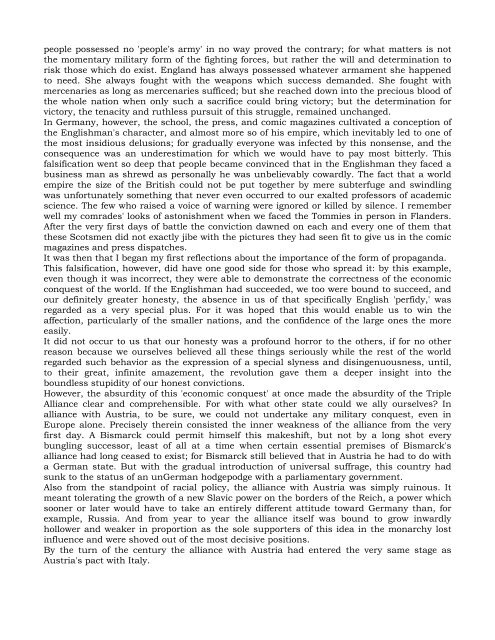Mein Kampf by Adolf Hitler
Mein Kampf by Adolf Hitler
Mein Kampf by Adolf Hitler
- TAGS
- kampf
- adolf
- hitler
- stuff2share.com
Create successful ePaper yourself
Turn your PDF publications into a flip-book with our unique Google optimized e-Paper software.
people possessed no 'people's army' in no way proved the contrary; for what matters is not<br />
the momentary military form of the fighting forces, but rather the will and determination to<br />
risk those which do exist. England has always possessed whatever armament she happened<br />
to need. She always fought with the weapons which success demanded. She fought with<br />
mercenaries as long as mercenaries sufficed; but she reached down into the precious blood of<br />
the whole nation when only such a sacrifice could bring victory; but the determination for<br />
victory, the tenacity and ruthless pursuit of this struggle, remained unchanged.<br />
In Germany, however, the school, the press, and comic magazines cultivated a conception of<br />
the Englishman's character, and almost more so of his empire, which inevitably led to one of<br />
the most insidious delusions; for gradually everyone was infected <strong>by</strong> this nonsense, and the<br />
consequence was an underestimation for which we would have to pay most bitterly. This<br />
falsification went so deep that people became convinced that in the Englishman they faced a<br />
business man as shrewd as personally he was unbelievably cowardly. The fact that a world<br />
empire the size of the British could not be put together <strong>by</strong> mere subterfuge and swindling<br />
was unfortunately something that never even occurred to our exalted professors of academic<br />
science. The few who raised a voice of warning were ignored or killed <strong>by</strong> silence. I remember<br />
well my comrades' looks of astonishment when we faced the Tommies in person in Flanders.<br />
After the very first days of battle the conviction dawned on each and every one of them that<br />
these Scotsmen did not exactly jibe with the pictures they had seen fit to give us in the comic<br />
magazines and press dispatches.<br />
It was then that I began my first reflections about the importance of the form of propaganda.<br />
This falsification, however, did have one good side for those who spread it: <strong>by</strong> this example,<br />
even though it was incorrect, they were able to demonstrate the correctness of the economic<br />
conquest of the world. If the Englishman had succeeded, we too were bound to succeed, and<br />
our definitely greater honesty, the absence in us of that specifically English 'perfidy,' was<br />
regarded as a very special plus. For it was hoped that this would enable us to win the<br />
affection, particularly of the smaller nations, and the confidence of the large ones the more<br />
easily.<br />
It did not occur to us that our honesty was a profound horror to the others, if for no other<br />
reason because we ourselves believed all these things seriously while the rest of the world<br />
regarded such behavior as the expression of a special slyness and disingenuousness, until,<br />
to their great, infinite amazement, the revolution gave them a deeper insight into the<br />
boundless stupidity of our honest convictions.<br />
However, the absurdity of this 'economic conquest' at once made the absurdity of the Triple<br />
Alliance clear and comprehensible. For with what other state could we ally ourselves? In<br />
alliance with Austria, to be sure, we could not undertake any military conquest, even in<br />
Europe alone. Precisely therein consisted the inner weakness of the alliance from the very<br />
first day. A Bismarck could permit himself this makeshift, but not <strong>by</strong> a long shot every<br />
bungling successor, least of all at a time when certain essential premises of Bismarck's<br />
alliance had long ceased to exist; for Bismarck still believed that in Austria he had to do with<br />
a German state. But with the gradual introduction of universal suffrage, this country had<br />
sunk to the status of an unGerman hodgepodge with a parliamentary government.<br />
Also from the standpoint of racial policy, the alliance with Austria was simply ruinous. It<br />
meant tolerating the growth of a new Slavic power on the borders of the Reich, a power which<br />
sooner or later would have to take an entirely different attitude toward Germany than, for<br />
example, Russia. And from year to year the alliance itself was bound to grow inwardly<br />
hollower and weaker in proportion as the sole supporters of this idea in the monarchy lost<br />
influence and were shoved out of the most decisive positions.<br />
By the turn of the century the alliance with Austria had entered the very same stage as<br />
Austria's pact with Italy.


